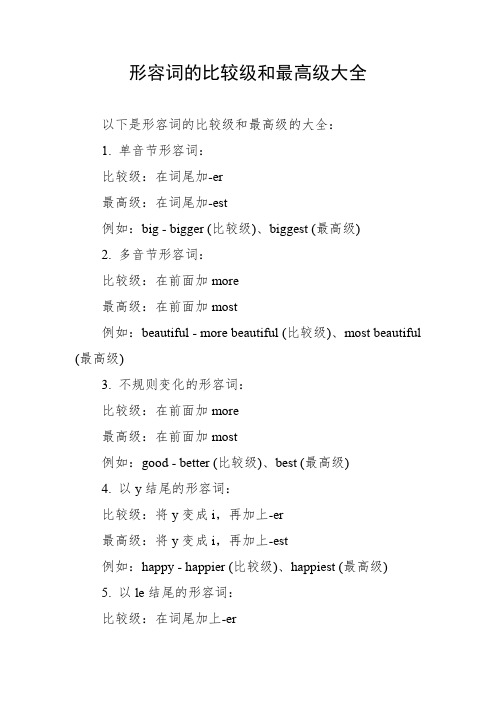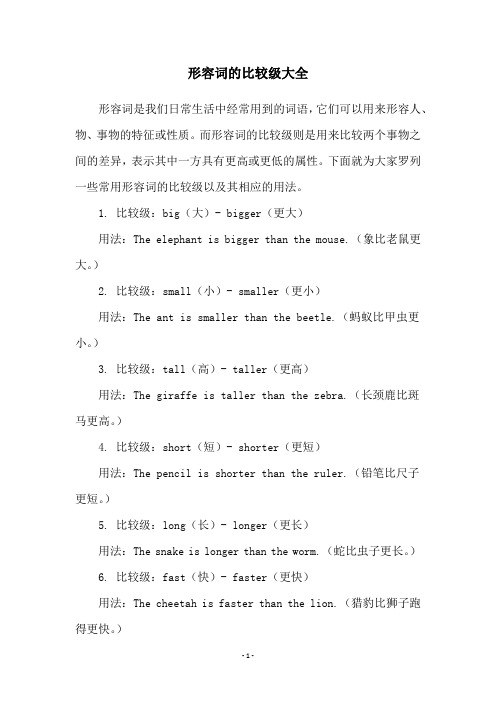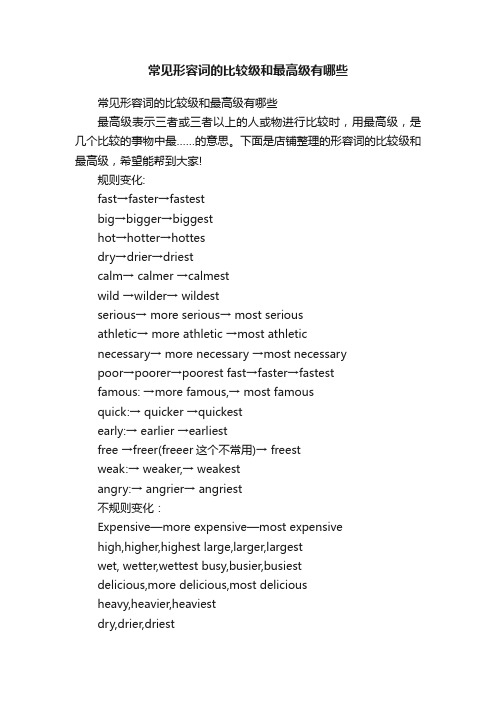形容词比较级
形容词的比较级

形容词的比较级形容词是我们用来描述人、事、物的词语,而比较级则是用来表示两个或多个事物之间的程度、大小、数量等差异的词形变化形式。
形容词的比较级能够帮助我们更加准确地表达事物之间的差异,让我们来详细了解一下形容词的比较级以及它在表达中的应用。
一、形容词的比较级构成方式形容词的比较级通常有以下几种构成方式:1. 在形容词后面加上-er例如:- 大 -- 大的 (big -- bigger)- 快 -- 快的 (fast -- faster)- 高 -- 高的 (tall -- taller)2. 在形容词后面加上辅音字母+y,并将-y变为-i,然后再加上-er例如:- 漂亮 -- 更漂亮的 (pretty -- prettier)- 有趣 -- 更有趣的 (funny -- funnier)- 聪明 -- 更聪明的 (smart -- smarter)3. 在形容词前面加上more例如:- 有名 -- 更有名的 (famous -- more famous)- 幸福 -- 更幸福的 (happy -- more happy)- 美丽 -- 更美丽的 (beautiful -- more beautiful)注意:有些形容词的比较级是不规则的,它们的形式变化与一般规则不同,需要我们单独记忆和掌握,例如:- 好 -- 更好的 (good -- better)- 少 -- 更少的 (little -- less)- 多 -- 更多的 (much -- more)二、形容词的比较级的用法形容词的比较级在英语中有广泛的应用,下面列举一些常见的用法:1. 表示两个事物之间的程度、大小、数量等差异例如:- Tom比Mike更高。
(Tom is taller than Mike.)- 我的狗比你的狗更聪明。
(My dog is smarter than yours.)- 这本书比那本书更有趣。
(This book is funnier than that one.)2. 表示某个事物在同类事物中更具特征或特点例如:- 这家餐厅的服务比其他餐厅更好。
形容词比较级有以下几种变化形式

形容词比较级有以下几种变化形式1.形容词原形加-er,如tall---taller,short---shorter,long---longer,fast---faster,old---older,young---younger,small---smaller等。
2.以辅音字母加-y结尾的形容词,把y改成i,再加-er,如:heavy---heavier,happy---happier,funny---funnier等。
3.重读闭音节结尾的形容词末尾只有一个辅音字母,要双写末尾字母,再加-er,如fat---fatter,thin---thinner,big---bigger,hot---hotter等。
例如:太阳比月亮大。
The sun is bigger than the moon.今天比昨天更热。
Today is hotter than yesterday.4.多音节形容词的比较级要用more加形容词原形,如:beautiful---more beautiful,interesting---more interesting,delicious---more delicious,expensive---more expensive,exciting---more exciting等。
例如:这个钱包比那个更漂亮。
This wallet is more beautiful than that one.他的书比你的书更有意思。
His book is more interesting than yours.5.形容词比较级的不规则变化,如:good/well---better。
你的家人或朋友生病了,你可以说I hope you get better soon.希望您早日康复。
又如:bad---worse,如果你最近很忙,但是又遇到很多麻烦事,你可以说Things can’t be worse.真是糟糕透了!其他常见的不规则变化有:old---older/elder,much/many---more,little---less,far---farther/further。
形容词的比较级和最高级大全

形容词的比较级和最高级大全以下是形容词的比较级和最高级的大全:1. 单音节形容词:比较级:在词尾加-er最高级:在词尾加-est例如:big - bigger (比较级)、biggest (最高级)2. 多音节形容词:比较级:在前面加more最高级:在前面加most例如:beautiful - more beautiful (比较级)、most beautiful (最高级)3. 不规则变化的形容词:比较级:在前面加more最高级:在前面加most例如:good - better (比较级)、best (最高级)4. 以y结尾的形容词:比较级:将y变成i,再加上-er最高级:将y变成i,再加上-est例如:happy - happier (比较级)、happiest (最高级)5. 以le结尾的形容词:比较级:在词尾加上-er最高级:在词尾加上-est例如:possible - more possible (比较级)、most possible (最高级)6. 少数不规则变化的形容词:比较级:在前面加more最高级:在前面加most例如:famous - more famous (比较级)、most famous (最高级)7. 特殊的比较级和最高级:例如:well - better (比较级)、best (最高级)8. 副词的比较级和最高级:比较级:在后面加-er最高级:在后面加-est例如:slowly - more slowly (比较级)、most slowly (最高级)以上是常见的形容词的比较级和最高级,但是也有一些不规则变化的形容词需要记忆。
同时,需要注意的是,有些形容词没有比较级和最高级,如unique。
形容词的比较级大全

形容词的比较级大全形容词是我们日常生活中经常用到的词语,它们可以用来形容人、物、事物的特征或性质。
而形容词的比较级则是用来比较两个事物之间的差异,表示其中一方具有更高或更低的属性。
下面就为大家罗列一些常用形容词的比较级以及其相应的用法。
1. 比较级:big(大)- bigger(更大)用法:The elephant is bigger than the mouse.(象比老鼠更大。
)2. 比较级:small(小)- smaller(更小)用法:The ant is smaller than the beetle.(蚂蚁比甲虫更小。
)3. 比较级:tall(高)- taller(更高)用法:The giraffe is taller than the zebra.(长颈鹿比斑马更高。
)4. 比较级:short(短)- shorter(更短)用法:The pencil is shorter than the ruler.(铅笔比尺子更短。
)5. 比较级:long(长)- longer(更长)用法:The snake is longer than the worm.(蛇比虫子更长。
) 6. 比较级:fast(快)- faster(更快)用法:The cheetah is faster than the lion.(猎豹比狮子跑得更快。
)7. 比较级:slow(慢)- slower(更慢)用法:The turtle is slower than the rabbit.(乌龟比兔子跑得更慢。
)8. 比较级:easy(容易)- easier(更容易)用法:The multiple-choice test is easier than the essay test.(选择题比论述题更容易。
)9. 比较级:difficult(困难)- more difficult(更困难)用法:Calculus is more difficult than algebra.(微积分比代数更困难。
形容词比较级有以下几种变化形式

形容词比较级有以下几种变化形式1.形容词原形加-er,如tall---taller,short---shorter,long---longer,fast---faster,old---older,young---younger,small---smaller等。
2.以辅音字母加-y结尾的形容词,把y改成i,再加-er,如:heavy---heavier,happy---happier,funny---funnier等。
3.重读闭音节结尾的形容词末尾只有一个辅音字母,要双写末尾字母,再加-er,如fat---fatter,thin---thinner,big---bigger,hot---hotter等。
例如:太阳比月亮大。
The sun is bigger than the moon.今天比昨天更热。
Today is hotter than yesterday.4.多音节形容词的比较级要用more加形容词原形,如:beautiful---more beautiful,interesting---more interesting,delicious---more delicious,expensive---more expensive,exciting---more exciting等。
例如:这个钱包比那个更漂亮。
This wallet is more beautiful than that one.他的书比你的书更有意思。
His book is more interesting than yours.5.形容词比较级的不规则变化,如:good/well---better。
你的家人或朋友生病了,你可以说I hope you get better soon.希望您早日康复。
又如:bad---worse,如果你最近很忙,但是又遇到很多麻烦事,你可以说Things can’t be worse.真是糟糕透了!其他常见的不规则变化有:old---older/elder,much/many---more,little---less,far---farther/further。
形容词比较级和最高级规律和不规则变化

形容词比较级和最高级规律和不规则变化形容词的比较级和最高级有规律性的变化和不规则变化两种形式。
规律比较级的变化:1. 单音节形容词和部分双音节形容词在末尾加上-er来表示比较级。
例如:big(大)- bigger(较大),fast(快)- faster(较快)。
2. 多音节形容词和所有以-y结尾的形容词,在形容词前面加上more来表示比较级。
例如:beautiful(美丽)- more beautiful (更美丽),busy(忙碌)- more busy(更忙碌)。
3. 以字母-e结尾的形容词,在末尾加上-r来表示比较级。
例如:wide(宽)- wider(较宽),nice(好)- nicer(较好)。
4. 以“辅音字母+y”结尾的形容词,将-y改为-i,再加上-er来表示比较级。
例如:happy(快乐)- happier(更快乐),busy(忙碌)- busier(更忙碌)。
规律最高级的变化:1. 形容词末尾加上-est来表示最高级。
例如:big(大)- biggest (最大),fast(快)- fastest(最快)。
2. 形容词前面加上most来表示最高级。
例如:beautiful(美丽)- most beautiful(最美丽),busy(忙碌)- most busy(最忙碌)。
不规则变化:有一些形容词的比较级和最高级是不规则的,需要记住它们的变化形式。
例如:1. good(好)- better(较好)- best(最好)2. bad(坏)- worse(较坏)- worst(最坏)3. many(多)/much(多)- more(更多的)- most(最多的)4. little(小)- less(较小)- least(最小)需要注意,有些形容词的比较级和最高级既可以使用规律变化形式,也可以使用不规则变化形式,根据上下文来决定使用哪种变化形式。
比较级的形容词

在英语中,形容词的比较级用于比较两个事物或人的特征。
通常情况下,比较级的形成有以下规则:1. 对于单音节形容词,通常在词尾加上 "-er" 来形成比较级。
- Fast → Faster- Small → Smaller- High → Higher2. 对于部分双音节形容词,也可以在词尾加上"-er",尤其是那些以"y" 结尾的形容词,变 "y" 为 "i" 再加 "-er"。
- Happy → Happier- Easy → Easier- Pretty → Prettier3. 对于多音节形容词和部分双音节形容词,通常在形容词前面加上 "more" 来形成比较级。
- Beautiful → More beautiful- Expensive → More expensive- Important → More important4. 不规则形容词的比较级需要单独记忆,因为它们不遵循上述规则。
- Good → Better- Bad → Worse- Far → Farther/Further使用比较级时,通常会和 "than" 这个词一起使用来进行比较。
例如:- She is happier than I am.- This book is more interesting than that one.- He runs faster than she does.记住这些规则可以帮助你正确地使用和构造英语形容词的比较级。
常见形容词的比较级和最高级有哪些

常见形容词的比较级和最高级有哪些常见形容词的比较级和最高级有哪些最高级表示三者或三者以上的人或物进行比较时,用最高级,是几个比较的事物中最……的意思。
下面是店铺整理的形容词的比较级和最高级,希望能帮到大家!规则变化:fast→faster→fastestbig→bigger→biggesthot→hotter→hottesdry→drier→driestcalm→ calmer →calmestwild →wilder→ wildestserious→ more serious→ most seriousathletic→ more athletic →most athleticnecessary→ more necessary →most necessarypoor→poorer→poorest fast→faster→fastestfamous: →more famous,→ most famousquick:→ quicker →qu ickestearly:→ earlier →earliestfree →freer(freeer这个不常用)→ freestweak:→ weaker,→ weakestangry:→ angrier→ angriest不规则变化:Expensive—more expensive—most expensivehigh,higher,highest large,larger,largestwet, wetter,wettest busy,busier,busiestdelicious,more delicious,most deliciousheavy,heavier,heaviestdry,drier,driesteasy easier easiestlazy lazier laziestpretty prettier prettiestnaughty naughtier naughtiestmealy mealier mealiestearly earlier earliestthirsty thirstier thirstiestfar→farther→farthestfar→further→furthestDull—duller--dullestLoud-louder--loudestBoring—more boring—most boringCreative—more creative—most creativeWarm---warmer--warmestgood / well→better→bestbad / ill→worse→worstmany / much→more→mostlittle→less→leastlate→later→ / latestlate→latter→last【拓展】关于形容词和副词的比较级一、含义1. 大多数形容词和副词有三个等级:原级、比较级、最高级: good – better - best2. 比较级:表示两者(人或物)之间的比较。
- 1、下载文档前请自行甄别文档内容的完整性,平台不提供额外的编辑、内容补充、找答案等附加服务。
- 2、"仅部分预览"的文档,不可在线预览部分如存在完整性等问题,可反馈申请退款(可完整预览的文档不适用该条件!)。
- 3、如文档侵犯您的权益,请联系客服反馈,我们会尽快为您处理(人工客服工作时间:9:00-18:30)。
Q2:形容词比good bad/ill many/much little
far
比较级 better worse more less farther further
Q3: 通常在什么情况用形容词比较级?
1、两者之间的比较,句中有明显的标志词 地球比月球大
The earth is larger than the moon. 变式练习:这本书比那本书有趣。
The Comparative Degree of Adjectives
形容词的比较级
thin
fat
Description Words for People 描述人的形容词
short
tall
has long hair
has short hair
loudly quietly
Liu Xiang
变式练习:他有越来越多的朋友。
2)More +and +more+ 原级 越来越···”(多音节 词和部分 双音节词)
保山变得越来越美丽 Baoshan is becoming more and more beautiful.
变式练习:英语越来越重要。
3、The + 比较级…,the + 比较级… “越…,就越 …” 你吃得越多,就变得越胖。 The more you eat, the fatter you will become. 变式练习:你锻炼的越多就越健康。
III 形容词的比较级基本运用 ①than 用比较级 ②Which/Who is + 比较级, A or B ? IV 形容词比较级在特殊情况下的几个用法 ① is the + 比较级 + of the two.( 两者中···较···) ②比较级+ and + 比较级 “越来越…” ③The + 比较级…the + 比较级… “越…越…” ④比较级形式用来表示最高级概念than any
汤姆是这两个男孩中 较高的一个
Tom is the taller of the two boys. 变式练习:曙光学校是两所学校中较好的一所。
2、越来越···比较级+ and + 比较级 越…”
(天单变音得节越词来和越部黑分。双音节词)
“越来
It's getting darker and darker .
3.thin thinner
big bigger
重读闭音节词只有一个辅音字母时,双写辅音字母,加 er,
4.easy easier
lucky luckier
以辅音字母加“y”结尾的双音节词,先改“y”为“i”再加 er,
二、多音节和部分双音节词 在词前加more 或most
important more important delicious more delicious boring more boring
than。
2、Which/Who is + 比较级, A or B ? 数学和英语,哪个更容易?
Which is easier, maths or English ? 变式练习:周杰伦和张杰,谁更受欢迎?
Q4:有哪些特殊情况下也使用形容词的比较级?
1、… is the +比较级 + of the two .(两者中···较···)
一、规则变化 二、不规则形容词的比较级
三、形容词比较级的用法
Q1:形容词比较级的规则变化有些?
一、单音节和 部分双音节词
1.slow slower
fast faster
young younger 一般在词尾加 er,
tall taller
2.fine finer
late later
以字母e 结尾的词,加r
4.比较级形式用来表示最高级概念 than any other+单数名词
比较级+ than the other +复数名词 (···比其他任何一个都···) Tom 在他班上比其他任何一个男孩都高。 Tom is taller than any other boy in his class. =Tom is taller than the other boys in his class =Tom is the tallest boy in his class.
Liu Yifei
Mike
Liu Yifei is thin. Mike is thinner than Liu Yifei.
Li Yong
Pan Changjiang
Li Yong is funny.
Pan Changjiang is Li Yong.
funnier than
Jim
Tom
Jim is athletic . Tom is more athletic than Jim.
Yao Ming
Liu Xiang is tall. Yao Ming is taller than LiuXiang.
Zen Zhiwei
Xiao xin
Zen Zhiwei is short . .
Xiao xin is shorter than Zen Zhiwei .
Summer is hot. Summer is ________ than spring. Winter is cold. Winter is ________ than autumn.
母,加 er, ? ④以辅音字母加“ y”结尾的双音节词 ,先改“y”为
“i”再加er, ? ⑤多音节和部分双音节词在词前加 more ? II 形容词比较级的五个特殊变化 ? ①.good/well —better ② bad/ill/badly —worse — ? ③ many/much —more ④ little —less ? ⑤far —farther
变式练习:这个教室比任何一个教室都大。
5. much,a lot ,a bit ,a little ,even , far 等修饰比较级 Lucy比她姐姐胖的多。 Lucy is much heavier than her sister.
变式练习:她今天比我更高兴。
课堂总结
? I 形容词的比较的基本构成 ? ①单音节和 部分双音节词一般在词尾加 er, ? ②以字母e 结尾的词,加 r, ? ③重读闭音节词只有一个辅音字母时 ,双写辅音字
